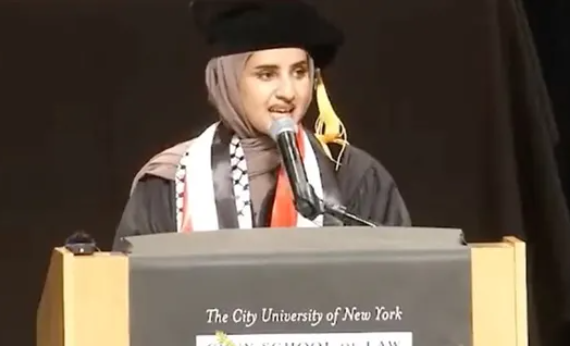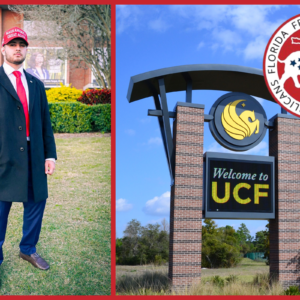In the same weekend that I was walking across the stage at my long-awaited commencement ceremony, countless other commencements were being held around the country, filled with proud families and excited graduates ready to take on the world.
Unbeknownst to me, and most others, that weekend the CUNY Law School commencement was also being held. And though the weekend finished without any noise, two weeks later the commencement speaker, Fatima Mousa Mohammed, found herself in the middle of an international firestorm, and in her own home of Queens, N.Y., on the cover of the New York Post with the headline, “Stark Raving Grad.”
Mohammed’s speech included disturbing criticisms of the United States and the State of Israel, as well as her own school, which she said failed students by supporting institutions like the NYPD and the US Military, which she labeled “fascist.”
Her speech was quickly ripped by critics and called “hate-filled” and “evil.” Some even described it as a “blatant call for insurrection.” Criticism swiftly arrived from politicians on both sides of the political aisle.
Then came calls for Mohammed to have her admission to the New York bar denied upon passing her exam. Others appealed to the New York Supreme Court. CUNY Law School quickly took down the video of the commencement ceremony they had posted and released a statement calling Mohammed’s address “hate speech.” Ironically, it is clear in the videos of the ceremony that most who attended the commencement certainly did not see it this way.
In fact, the videos paint a clear picture of support for Mohammed’s words, both from faculty and students alike. And it is this act of support which the outcry of criticism should be directed at, not a young woman doing exactly what she was selected to do.
The words in Mohammed’s speech should not be surprising to anyone. The surprising thing in this situation is that so many in the audience thought that her ideas were worthy of the applause and cheers that they received. This is a manifestation of where so many of our youth stand today and what the fabric of this nation has become.
And the response, attempting to immediately silence and censor Mohammed, is only a representation of a symptom of a much larger disease that so many in our country today do not know how to remedy. Much like it was easy for many to once shout that Rudy Giuliani was “not fit to practice law” because they disagreed with his sentiments, others have now taken to these same easy attacks.
The problems we all face today are not the ideas of Mohammed’s; she was evidently reflecting the views of many. Moreover, Mohammed cannot enforce or propagate her ideas on anybody. When major institutions display dangerous viewpoints, and the majority of Americans sit silently, that becomes the issue which we should be paying attention to. Instead, we live in a society where each party is simply eager to cancel the other.
This is hardly a solution.
In the United States, the remedy would historically stem from the media and the education and judicial systems. Many on both sides of the political aisle argue that none of these institutions are impartial today.
The argument that someone with dangerous ideas is not entitled to speak or to practice law, for example, is only indicative of a society which is deeply unwell. Because when our institutions do not fulfill their obligations and think that the First Amendment can be compromised, we all end up paying the price.
Let us not so quickly forget the admonishment of Voltaire.


















Add comment